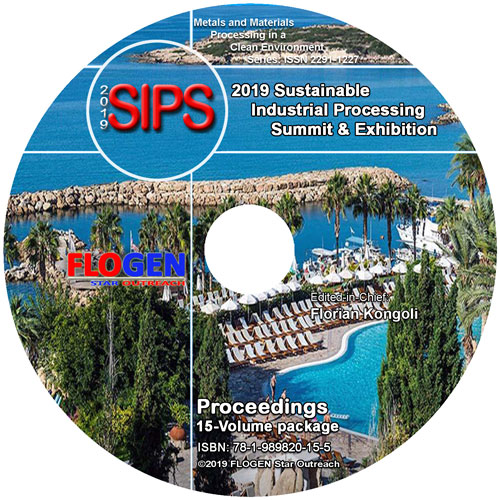2019-Sustainable Industrial Processing Summit
SIPS2019 Volume 1: Angell Intl. Symp. / Molten Salt, Ionic & Glass-forming Liquids: Processing and Sustainability
| Editors: | F. Kongoli, M. Gaune-Escard, J. Dupont, R. Fehrmann, A. Loidl, D. MacFarlane, R. Richert, M. Watanabe, L. Wondraczek, M. Yoshizawa-Fujita, Y. Yue |
| Publisher: | Flogen Star OUTREACH |
| Publication Year: | 2019 |
| Pages: | 177 pages |
| ISBN: | 978-1-989820-00-1 |
| ISSN: | 2291-1227 (Metals and Materials Processing in a Clean Environment Series) |

CD shopping page
Rare earth iron permanent magnets sustain the world
Masato Sagawa1;1DAIDO STEEL CO. LTD., Nagoya, Japan;
Type of Paper: General Plenary
Id Paper: 191
Topic: 46
Abstract:
Voice coil motors (VCM) and spindle motors in hard disc drives (HDD), speakers, vibration motors and autofocus cameras in smartphones all need neodymium - iron - boron (Nd-Fe-B) permanent magnets (PMs) in order to function. Compressors in air conditioners employ Nd-Fe-B PMs as well. Every kind of electric vehicle or robot makes use of Nd-Fe-B PMs to improve efficiency and to become more compact. So far, no alternative material was found to replace those specific PMs. In this sense, it is no exaggeration to say that rare earth iron (R-Fe) PMs sustain the world.
Who invented the R-Fe PMs? The Nd-Fe-B sintered magnet was first pointed out by the author whereas Nd-Fe-B melt spun magnets were discovered by J. Croat, both in 1982, and samarium - iron -nitrogen (Sm-Fe-N) magnets were sorted out by T. Iriyama in 1987. M. Sagawa and T. Iriyama were both beginners in the field of permanent magnets upon the time of each invention. After each invention, industrial production soon followed while fundamental research on R-Fe PMs has developed tremendously in the world.
To sustain the world using R-Fe PMs, it is important to eliminate concerns about resources of rare earths. For this purpose, M. Sagawa has been engaged in the development of two processes; one for eliminating the usage of dysprosium (Dy) for high coercivity Nd-Fe-B magnets used for electric vehicles (EVs) and another for a process aiming at a perfect net shape process. After sintering, no machining is necessary for usage in motors. In the meantime, T. Iriyama is engaged in developing high performance Sm-Fe-N bonded magnets to use the surplus of the Sm resource as a result of an extremely high demand for Nd. Because it is important to recycle the rare earths, technologies capable of recycling 100% of rare earths from all applications of R-Fe PMs will be established soon. The development of high coercivity Nd-Fe-B PMs containing no Dy will be achieved in a few years, and there will be no concern any longer about rare earth resources. Actually, there is no concern about the resource of Nd that may last for 1000 years.